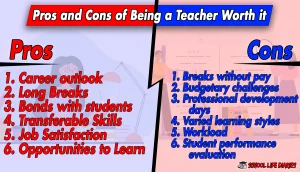Yes, being a teacher is definitely worth it. Teaching is one of the noblest professions out there, as it involves imparting knowledge and inspiring and guiding students to become their best selves. Being a teacher requires more than just conveying facts to students.
It also involves nurturing them and helping them develop the skills needed for lifelong learning. Being a teacher is certainly a rewarding and worthwhile experience, one that can bring a great deal of satisfaction and fulfillment.
It is a profession that has long been recognized and respected in society. Teaching offers a unique opportunity to make a positive difference in the world, and it is something that should be valued and appreciated. Teaching can also provide a sense of stability and security.
Is Teaching Worth It?
Yes, Teaching is an incredibly rewarding profession that has been around for centuries. Despite current education reform movements in the United States, there are still plenty of reasons why it is worth it to become a teacher. Teaching is not just about imparting knowledge to students and helping them learn, but it is also about being an important part of their lives and helping them grow and develop.
1. Rewarding Experience:
Teaching can be a rewarding experience, as it allows you to work directly with students and help them learn and grow. Whether you’re working in a traditional classroom setting or one-on-one with students, you have the opportunity to make a real impact on their lives and shape their future success.
2. Valuable Skills:
Teaching can also help you develop a range of valuable skills and competencies. These may include communication and interpersonal skills, leadership abilities, project management skills, organization and time management skills, and more.
3. Career Advancement Opportunities:
As a teacher, you have many opportunities to advance your career through professional development programs or by pursuing additional degrees or certifications. This can help you grow and advance in your career, both personally and professionally.
4. Flexible Career Opportunities:
Whether you want to work as a classroom teacher or pursue a career in education administration, teaching offers plenty of opportunities for professional growth and advancement.
5. Enjoyable Work Environment:
Teaching can be an enjoyable and engaging profession, as it allows you to build relationships with your students and make a positive impact on their lives.
6. Work/Life Balance:
In addition to offering flexible career options and a satisfying work environment, teaching also allows you to achieve a good work/life balance. Whether you want to spend more time with family or explore other interests outside of work, teaching offers the flexibility to do so.
7. Unleash Your Creativity & Imagination:
As a teacher, you get the opportunity to use your creativity and imagination in a variety of ways. Whether you are designing engaging lesson plans, coming up with fun activities for your students, or exploring new teaching methods, there are endless opportunities to explore and experiment in the classroom.
8. Give Back to Your Community:
Teaching is also a great way to give back to your local community by helping shape the minds and futures of the next generation. Whether you are working with young children, teens, or adults, you have the opportunity to make a meaningful impact on others and help them reach their full potential.
9. Work With Talented & Innovative Colleagues:
You also get to work alongside talented and innovative colleagues who are passionate about education and committed to providing the best possible learning experiences for their students. Whether you are working alongside other teachers, educational experts, or administrators, you can benefit from sharing ideas and collaborating with others in order to continuously improve your teaching practices and positively impact your students.
Related Article: 15 Inspiring Reasons to Become a Teacher
Why do Some People Love Being Teachers?
Some people are naturally passionate about teaching and have an unwavering commitment to making a positive impact in the world by providing students with the knowledge and skills they need to succeed.
The main reason why this particular career path is so beloved, ranging from its sense of purpose, intellectual engagement, and intrinsic rewards to the fact that it allows one to simply practice being a human who cares about others.
One of the biggest reasons why so many people choose this particular career path is that teaching has become a very lucrative profession for those with advanced degrees, particularly at the secondary school level for STEM subject areas.
In fact, data from 2015 to 2016 shows that the average salary for a high school teacher with an advanced degree was $63,000 compared to the national average of $50,500 per year.
Is It a Good Idea to Become a Teacher?
Yes, Becoming a teacher is a great idea for many teachers. It provides an opportunity to help shape the minds of future generations. Teaching allows you to work with people from all walks of life, giving you the opportunity to learn, grow and make connections with others.
Teaching provides the opportunity to develop and refine interpersonal and communication skills. It is also a great way to give back to society by helping others learn, explore and understand new concepts. Teaching provides financial stability and job security, as it is an essential part of providing an education for children across the country.
What Qualities do you need to be a Good Teacher?
To be a successful teacher, a variety of qualities are necessary.
1) A good teacher must have a thorough understanding of the content they are teaching.
2) Good teachers must stay ahead of their students in terms of knowledge and proficiency with the subject material, so they can accurately provide instruction and guidance.
3) Having strong organizational skills is essential, so that you know where to find the content you need when you need it. The ability to be flexible is key as well.
4) In order a good teacher, being able to adapt and change your methods in response to student needs is crucial.
How to Earn More as a Teacher?
Earning more as a teacher is an achievable goal that relies on hard work, dedication, and creativity. To increase earning potential, teachers must be able to effectively analyze their strengths and weaknesses in order to maximize their areas of expertise. One way to start is by strengthening one’s core teaching skills.
Teachers should identify their strongest academic subjects and create lesson plans that focus on these areas. It is important to build a positive classroom culture, as students are more likely to excel under an inspiring teacher who fosters creativity and critical thinking.
The effective strategy for earning more as a teacher is by seeking out additional opportunities such as mentoring or teaching summer school. Some teachers may feel intimidated by the additional workload, but it is important to remember that the benefits of these roles include increased exposure and networking opportunities.
Do teachers make enough money?
No, the majority of teachers are not making enough money. They often face stagnant wages, lack of compensation for additional duties, and diminishing funding for school districts. One of the major factors impacting teacher pay is that many states have failed to keep up with inflation when raising teacher salaries.
This means that in some states across the country, teachers’ salaries have actually decreased in real terms since the 1970s. Many teachers are not compensated when they take on extra duties outside of their regular teaching responsibilities such as coaching and providing tutoring services.
Why Do People Opt-Out of Teaching if Being a Teacher Worth it?
Teaching is a rewarding and fulfilling career, yet many people still choose to leave the profession. Below are some common reasons why people may decide to opt-out of teaching even after only a few years in the field.
1. The Heavy Workload:
Teaching is an incredibly demanding job that requires an immense amount of planning and preparation. Not only do teachers have to spend long hours lesson planning, but they also need to conduct classroom activities, grade papers, lead extracurricular activities, and stay up-to-date on current educational trends. Unfortunately, many teachers don’t receive the resources or support to help them manage these tasks, leaving them feeling overwhelmed and underprepared for their jobs.
2. Stress:
Teaching can be a stressful job due to the amount of pressure from students, parents, administration, and other teachers. Teachers may feel a constant need to prove their worth, as well as the pressure of keeping up with ever-changing educational standards. This can create an environment that’s stressful and exhausting.
3. Lack of Support Systems:
New teachers often find it difficult to adjust to their new jobs, especially when there is a lack of resources or support systems in place to help them. Without these resources, teachers can quickly become overwhelmed and may decide that teaching is not the right fit for them.
4. Continuous Training and Re-Training:
As educational standards change over time, teachers must constantly stay up-to-date on current trends and strategies in the classroom. This can be a very difficult task since teachers often do not have the time or resources to attend necessary training sessions. They may decide that it’s not worth the effort to continue their education and opt out of teaching altogether.
5. Bad Student Behavior:
While every teacher is expected to have a few instances of bad student behavior, it can become overwhelming when it occurs on a regular basis. If teachers don’t feel supported by the administration in dealing with these issues, they may decide that teaching is not worth the hassle and leave the profession.
6. Finding Better Career Opportunities:
Many teachers may find better career opportunities outside of education after gaining experience in the classroom. These opportunities could include higher salaries, more flexible schedules, or different types of work altogether. Many people decide to move on after a few years of teaching and pursue other career paths.
7. The Pay is Not Always What it Seems:
While teaching can be a rewarding experience, the pay can often be less than expected after factoring in hours worked and expenses. Therefore, some teachers may decide to leave the field when they find positions that offer higher salaries for similar responsibilities.
Tips to Stay Motivated as a Teacher
Many teachers find themselves feeling unmotivated or disheartened by the daily demands of the job. Being a teacher can be a difficult and sometimes stressful job, but there are some simple tips to help you stay motivated.
1. Set realistic goals for yourself:
Having clear, attainable goals can help you stay focused and motivated on the tasks at hand. Whether it’s a specific goal related to your job or personal life, be sure to set reasonable and achievable targets that will keep you inspired and moving forward.
2. Find support groups or online communities for teachers:
Connecting with other teachers can be a great way to build your network and share advice, tips, and resources. There are many online forums and communities that are dedicated specifically to helping teachers find the support they need to stay motivated.
3. Take breaks often throughout the day:
It’s easy to get caught up in your work and forget to take breaks, but it’s important to make time for yourself throughout the day. Whether you step outside for some fresh air or simply take a few minutes to meditate or do some deep breathing exercises, taking regular breaks can help refresh your mind and recharge your energy levels.
4. Cherish your relationships with students and colleagues:
Having positive relationships with those you work with is essential for a happy and successful teaching career. Make time to connect with your students and colleagues, build trust, and establish meaningful relationships that will make the job feel more rewarding.
5. Stay positive:
Being a teacher can sometimes be challenging, but it’s important to stay positive and focus on the good aspects of your job. Avoid getting caught up in negativity or setbacks, and instead, approach each day with a positive mindset that will help keep you motivated and engaged in your work.
6. Be patient and persistent:
Teaching is a long-term career that requires patience, persistence, and dedication. Remember that it can take time to see results, and trust that the work you do is a difference in your students’ lives. No matter how challenging or stressful things get, remember to stay patient and keep pushing forward toward your goals. With these tips, you can stay motivated and inspired in your teaching career.
7. Seek professional feedback:
As a teacher, it’s important to stay open to feedback and criticism from others. Whether it’s from your colleagues or supervisors, seeking out professional feedback can help you identify areas for improvement and better understand what you need to do in order to be successful.
8. Celebrate your successes:
It’s important to acknowledge and celebrate your accomplishments, both big and small. Whether it’s getting a new student to master a difficult skill, or simply making it through another day at school without feeling overwhelmed, take time to recognize your achievements and savor the sense of satisfaction that comes along with them.
9. Embrace change:
Teaching is a dynamic and ever-changing field, and it’s important to accept and embrace this change. Whether it’s implementing new teaching methods or simply adapting to changes in the classroom environment, be open to new ideas and approaches that can help you thrive in your career.
Pros and Cons of Being a Teacher Worth it
Pros
1. Career outlook:
The career outlook for teachers is very encouraging. The U.S. Bureau of Labor Statistics projects that from 2019 to 2029, the field of teaching will increase by 4% – indicating that there will be plenty of opportunities for career growth in this area.
2. Long Breaks:
Teachers also have the benefit of taking long breaks throughout the year. Whether it’s a holiday break or spring break, teachers have time off to rest and recharge their batteries.
3. Bonds with students:
One of the biggest perks of being a teacher is the strong bonds that you form with your students. Whether it’s nurturing a child’s love of learning, encouraging their development, or simply making them feel valued and respected, there is something truly rewarding about helping shape young minds.
4. Transferable Skills:
Teaching is not just about imparting knowledge to students, but also about helping them to develop valuable life skills. Teachers are highly skilled communicators and problem-solvers, and these key abilities are easily transferable to a range of different roles and industries.
5. Job Satisfaction:
Teaching can be challenging at times, but it is also immensely rewarding. As a teacher, you will have the opportunity to make a real difference in the lives of your students, and to help them to grow both academically and personally. This can be extremely satisfying, especially when you see your students succeed and thrive.
6. Opportunities to Learn:
Being a teacher also allows you to continue to learn and grow. Whether you are teaching in a classroom, leading professional development workshops, or working on curriculum design, there are many opportunities for lifelong learning and growth within the field of education.
Cons
1. Breaks without pay:
One of the primary drawbacks to teaching is the lack of breaks without pay. Whether it’s during the school day or over summer and holiday periods, teachers often find themselves working long hours without compensation.
2. Budgetary challenges:
The major challenge that teachers face is budgetary constraints. With limited resources available to support their professional development, many teachers feel they are unable to implement new teaching strategies or take part in training programs that could help improve their teaching skills.
3. Professional development days:
Teachers often struggle with navigating the demands of their job while also carving out time for themselves. Whether it’s finding time to relax or pursuing other personal interests, teachers must be able to balance a number of competing priorities in order to succeed both professionally and personally.
4. Varied learning styles:
The con of being a teacher is having to accommodate the varied learning styles of their students. The classroom is becoming increasingly diverse, with students from different backgrounds coming in with different needs and abilities. It can be a challenge for teachers to find ways to ensure that each student is able to access the content in a way that works best for them.
5. Workload:
The challenge that teachers face is managing the workload associated with their position. There is a lot of paperwork, grading, and lesson planning involved in being a teacher, which can take up a considerable amount of time and energy.
6. Student performance evaluation:
Teachers are also tasked with evaluating student performance on a regular basis. This often involves providing feedback on assignments, tests, and projects, as well as determining grades based on students’ efforts and achievements. While this can be a difficult responsibility, it is an important part of ensuring that every student is striving to do their best.
Final Verdict: Is Being a Teacher Worth it?
Being a teacher is an extremely rewarding and fulfilling profession that comes with many challenges. Teachers have the opportunity to make a difference in the lives of their students and help them succeed in school and in life.
If you have a passion for teaching and working with students, then it is definitely worth considering as a career option. There are many perks and rewards that come with being a teacher, such as making a difference in the lives of your students and having summers off.







